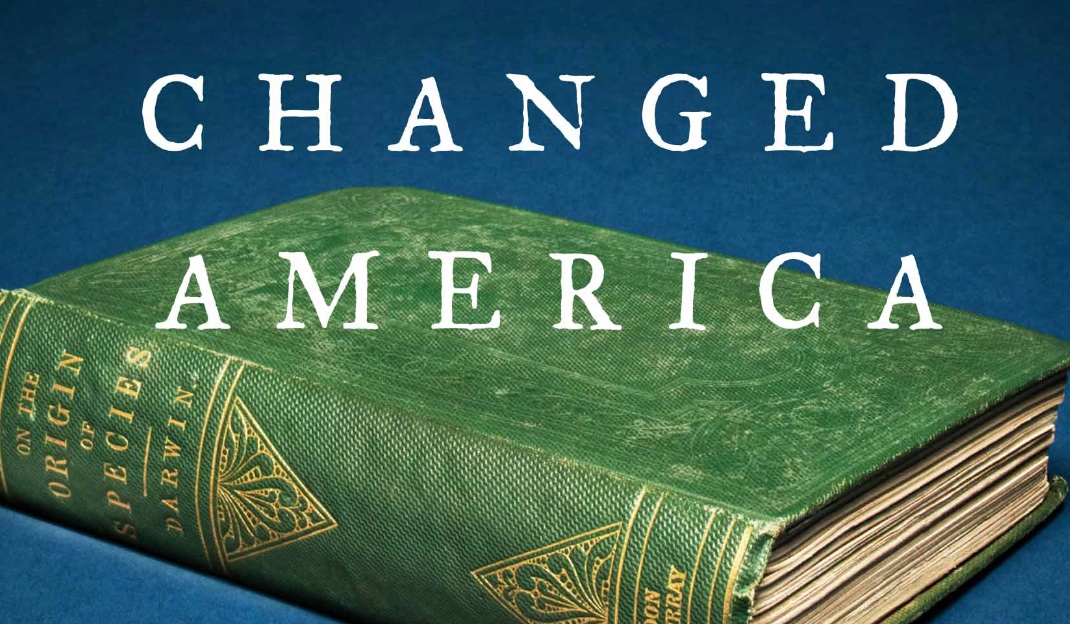The Book that Changed America: How Darwin’s Theory of Evolution Ignited a Nation

Visitors to this site might be particularly amenable to a set of claims by Randall Fuller in The Book that Changed America: How Darwin’s Theory of Evolution Ignited a Nation. “Books can change a life,” he declares. “Books can also change the world.” His delightful, elegant intellectual history charts the course of one earthshaking book, Charles Darwin’s On the Origin of Species, as it exploded onto American shores in 1860, on the eve of the Civil War. The publication of Origin was “nearly as seminal” as that cataclysmic event, Fuller ventures, even if initially it resonated for reasons that are not well remembered today.
While the author’s claim for the impact of books refers to the ideas contained therein, he also examines the outsize influence of one well-worn copy of Origin, which Darwin himself sent to Asa Gray at Harvard; Gray was America’s preeminent botanist and became the English naturalist’s greatest Stateside champion. From there Fuller traces the book’s momentous path among early America’s tight-knit intellectual elite. Gray loaned his copy to Charles Loring Brace, the social reformer who founded the Children’s Aid Society. Brace, who eventually claimed to have read the 400-page Origin thirteen times, brought it to a dinner party in Concord, Massachusetts. There, he introduced the book to his host, Franklin Sanborn — a radical abolitionist who had helped fund John Brown’s failed raid on the federal armory at Harpers Ferry, which was intended to arm slaves for revolt — and to Sanborn’s other guests, Transcendentalist philosopher Bronson Alcott (father of Louisa May) and Henry David Thoreau. (Ralph Waldo Emerson, on a lecture tour of the western states, heard of Origin from Thoreau and wrote to his wife complaining that he had not been able to obtain a copy “in these dark lands.”) The heavily annotated copy is now housed at Harvard.
Because these intellectuals were prolific letter writers and faithful diarists, Fuller, an English professor at the University of Tulsa and author of From Battlefields Rising: How the Civil War Transformed American Literature, is able to describe the immediate effects of Darwin’s ideas on these early, important readers. We often think of Darwin’s theory of natural selection, the process by which species change over time in order to adapt to their environments, as the opening salvo in the clash between science and religion. (The conflict between evolution and creationism was dramatized by the 1925 Scopes trial and continues to have stubborn relevance today.) Before Darwin, science and religion had coexisted peaceably, because most scientists saw themselves simply as charged with understanding the creations of God.
But, as Fuller demonstrates, Darwin’s first readers drew something else from his work: they “eagerly embraced the Origin of Species because they believed the book advanced the cause of abolition,” Fuller writes. “By hinting that all humans were biologically related, Darwin’s work seemed to refute once and for all the idea that African American slaves were a separate, inferior species.” That notion had been advanced by the scholarly field of ethnology, which was deeply involved in debates over slavery. “Most American ethnologists believed that blacks had been separately created in Africa and endowed with lesser intellectual capacities than whites,” Fuller notes. The abolitionist press praised Darwin for undermining that argument. It’s fascinating, though, to read about the tightrope Frederick Douglass was compelled to walk when engaging with the new theory. The African-American writer and orator “embraced Darwin’s vision of common inheritance,” Fuller writes, but because racist narratives depicted black people as primates, he “consistently evaded that portion of evolutionary theory that linked human beings to nonhuman species.”
Darwin himself hadn’t gone quite that far: he confined his claims to plants and animals, cannily avoiding the application of his findings to humans. “The tone of Darwin’s book — so reserved, so reasonable — cloaked insights that were explosive and deeply unsettling,” Fuller observes. It took time for some of those insights to sink in, but once they did, Fuller’s protagonists wrestled with them in different ways. Brace, who had devoted his life to helping the poor and the weak, didn’t want to accept that God had created a system in which only the fittest survived. But when Darwin wrote that natural selection worked for “the preservation and adding up all that is good,” Brace inferred, in Fuller’s words, that “human society was gradually headed toward perfection.” After the Civil War, many saw that conclusion as having special application to America, a society characterized by intense competition and rapid change and one that viewed itself as a progressive force in history.
Alcott ultimately believed, in Fuller’s words, that “Darwin’s ideas stripped life of its grandeur. They made a mockery of one’s deepest certainties that the world had been wisely designed.” Even Gray, Darwin’s staunch defender and the one who introduced his theory to a wide American audience through a series of reviews in the Atlantic Monthly, was later beset by doubts. In struggling to reconcile Darwinism with his religious beliefs, he suggested that “natural selection . . . might be God’s chosen method of creation,” an idea eventually accepted by liberal clergy who found Darwin’s science irrefutable. Thoreau, on the other hand, deeply moved by Origin, was convinced of “something almost as wondrous” in place of intelligent design: according to Fuller, he saw “a universe authored not by some abstract Almighty — but by itself. The world, Thoreau suggests, is its own autobiography.”
Can a book still change the world? Right now a tweet would seem to have a better shot. But questions that are still asked today, and more urgently by some in recent months — whether history is a narrative of progress, whether the arc of the universe bends toward justice — have their beginnings in the heady times evoked in Fuller’s exhilarating book. He has made them immensely instructive and enjoyable to ponder.